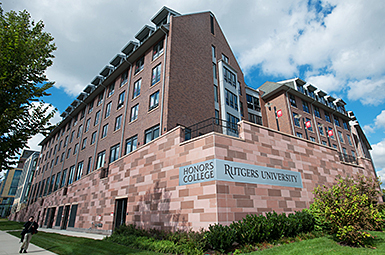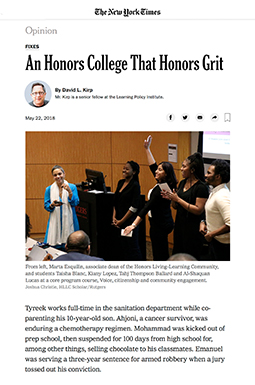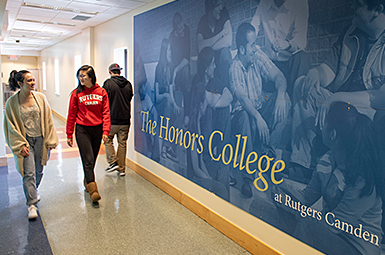Outstanding Honors Colleges
After creating or expanding honors colleges at each location, Rutgers began recruiting and engaging greater numbers of top-performing students.
 The Honors College at Rutgers University–New Brunswick complements strong honors programs in the undergraduate schools and attracts some of the highest-achieving high school graduates from New Jersey and across the nation. These students likely would have enrolled in universities outside New Jersey without the draw of a prestigious opportunity.
The Honors College at Rutgers University–New Brunswick complements strong honors programs in the undergraduate schools and attracts some of the highest-achieving high school graduates from New Jersey and across the nation. These students likely would have enrolled in universities outside New Jersey without the draw of a prestigious opportunity.
- A 500-bed residential and academic facility opened in 2015.
- On average through 2019, incoming students earned SAT scores above 1500 and GPAs above 4.0.
- First-year students live and learn alongside faculty fellows.

The Honors Living-Learning Community (HLLC) at Rutgers University–Newark is revolutionizing the concept of an honors college. The HLLC identifies the homegrown knowledge of talented students, relying on measures like SAT scores but also on a holistic assessment of talents and characteristics associated with a student’s ability to thrive in college and contribute to the greater good.
- Students receive a residential scholarship and engage in internships, research assistantships, and service opportunities.
- A 400-bed residential and academic facility was built to house HLLC.
- Prudential Financial established a $10 million scholarship program for Newark residents enrolling in HLLC—the largest gift, as of 2019, at Rutgers–Newark.
 The Honors College at Rutgers University–Camden, more than 20 years old, expanded to include not only first-year students but also transfer and rising sophomores, resulting in a record enrollment of more than 500 students as of 2019.
The Honors College at Rutgers University–Camden, more than 20 years old, expanded to include not only first-year students but also transfer and rising sophomores, resulting in a record enrollment of more than 500 students as of 2019.
- An engagement activity is required every semester.
- Students pursue academic “commitments”—second majors, minors, and departmental honors—or undertake academic “enhancements”—such as undergraduate research, internships, and the UN Summer Study Program.